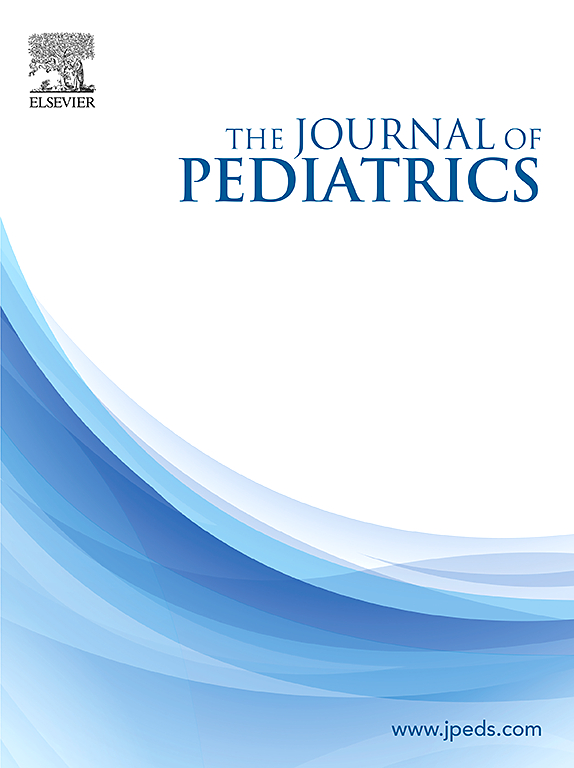Clinical Guidelines for Management of Infants Born before 25 Weeks of Gestation: How Representative Is the Current Evidence?
IF 3.5
2区 医学
Q1 PEDIATRICS
引用次数: 0
Abstract
Objective
To determine whether management guidelines for infants born extremely preterm are representative for those infants <25 weeks of gestation.
Study design
Three guidelines were reviewed: the 2022 European Consensus Guidelines on the Management of Respiratory Distress Syndrome, the 2017 American Academy of Pediatrics Guidelines for Perinatal Care, and the 2020/2021 International Liaison Committee on Resuscitation guidelines. All referenced studies for overlapping recommendations were reviewed. Data extracted included the total number and proportion of infants <25 weeks of gestation in the original articles referred in the guidelines. Where the exact number of infants <25 weeks of gestation was unobtainable, this was conservatively estimated by statistical deduction.
Results
Eight recommendations were included in 2 or more guidelines: (1) antenatal corticosteroids, (2) antenatal magnesium sulfate, (3) delayed cord clamping, (4) thermoregulation at birth, (5) initial oxygen concentration at birth, (6) continuous positive airway pressure, (7) surfactant, and (8) parenteral nutrition. In total, 519 studies (n = 409 986) informed these 8 recommendations, of which 335 (64.5%) were randomized controlled trials (n = 78 325). Across all studies, an estimated 59 360 (14.5%) infants were <25 weeks of gestation. Within randomized controlled trials alone, an estimated 5873 (7.5%) infants were <25 weeks of gestation. A total of 196 (37.8%) studies did not include any infants <25 weeks of gestation.
Conclusions
Infants born <25 weeks of gestation are not well-represented in the evidence used to develop major clinical guidelines for infants born extremely preterm. Future studies should provide evidence for this population as a distinct cohort.
妊娠25周前出生婴儿管理临床指南:目前的证据有多大代表性?
目的:确定极度早产婴儿的管理指南是否具有代表性研究设计:审查了三项指南:2022年欧洲呼吸窘迫综合征管理共识指南、2017年美国儿科学会围产期护理指南和2020/21年国际复苏联络委员会指南。对重叠建议的所有参考研究都进行了审查。结果:两份或两份以上的指南中纳入了8项建议:1)产前皮质类固醇,2)产前硫酸镁,3)延迟脐带夹紧,4)出生时体温调节,5)出生时初始氧浓度,6)持续气道正压,7)表面活性剂,8)肠外营养。519项研究(n=409,986)证实了这8项建议,其中335项(64.5%)为随机对照试验(rct) (n=78,325)。在所有研究中,估计有59,360(14.5%)名婴儿出生
本文章由计算机程序翻译,如有差异,请以英文原文为准。
求助全文
约1分钟内获得全文
求助全文
来源期刊

Journal of Pediatrics
医学-小儿科
CiteScore
6.00
自引率
2.00%
发文量
696
审稿时长
31 days
期刊介绍:
The Journal of Pediatrics is an international peer-reviewed journal that advances pediatric research and serves as a practical guide for pediatricians who manage health and diagnose and treat disorders in infants, children, and adolescents. The Journal publishes original work based on standards of excellence and expert review. The Journal seeks to publish high quality original articles that are immediately applicable to practice (basic science, translational research, evidence-based medicine), brief clinical and laboratory case reports, medical progress, expert commentary, grand rounds, insightful editorials, “classic” physical examinations, and novel insights into clinical and academic pediatric medicine related to every aspect of child health. Published monthly since 1932, The Journal of Pediatrics continues to promote the latest developments in pediatric medicine, child health, policy, and advocacy.
Topics covered in The Journal of Pediatrics include, but are not limited to:
General Pediatrics
Pediatric Subspecialties
Adolescent Medicine
Allergy and Immunology
Cardiology
Critical Care Medicine
Developmental-Behavioral Medicine
Endocrinology
Gastroenterology
Hematology-Oncology
Infectious Diseases
Neonatal-Perinatal Medicine
Nephrology
Neurology
Emergency Medicine
Pulmonology
Rheumatology
Genetics
Ethics
Health Service Research
Pediatric Hospitalist Medicine.
 求助内容:
求助内容: 应助结果提醒方式:
应助结果提醒方式:


